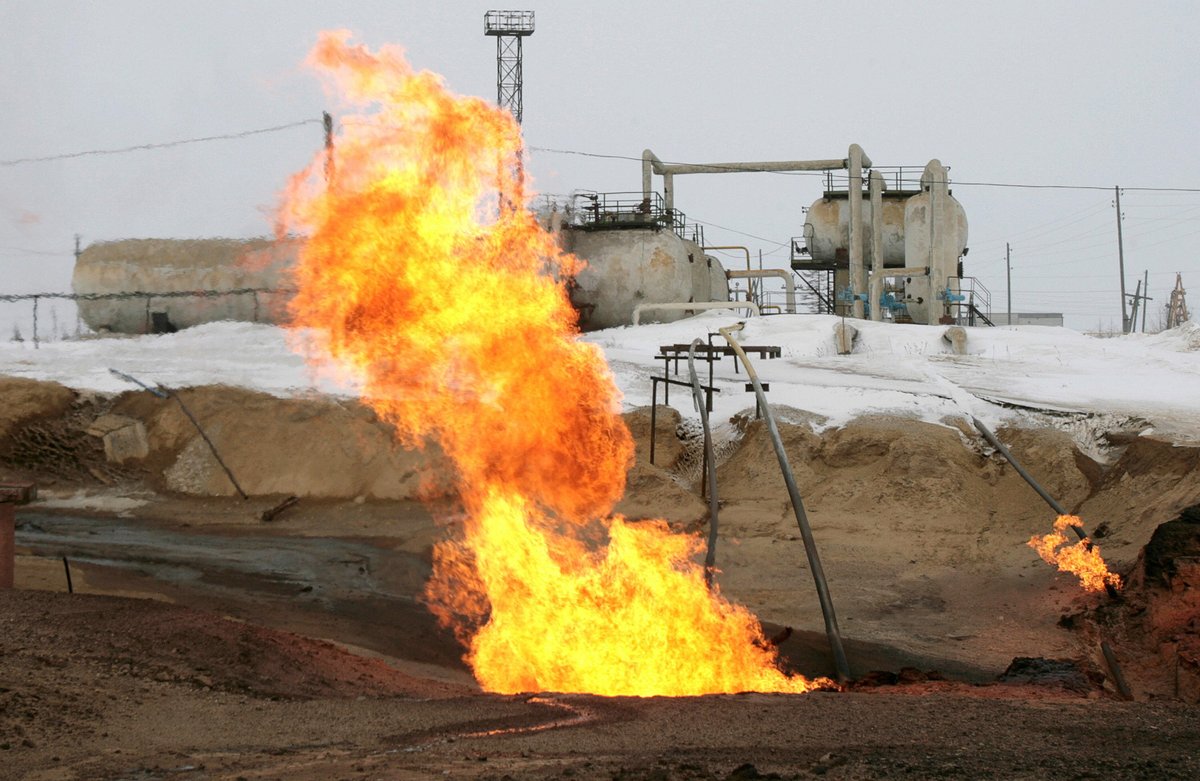Introduction
In the days after Putin’s army invaded Ukraine in February 2022, almost every western oil company announced that they would stop doing business in Russia. Some took a bit longer, persuaded by the onset of sanctions. But it seemed – at least, as the financial press reported it – that a historic shift was underway. Thirty years after arriving in post-Soviet Russia, the oil majors appeared to be retreating from one of the world’s top fossil fuel producers. Russia is home to the world’s largest gas reserves and in 2021 was the biggest exporter of oil.
‘This military action represents a fundamental change,’ said Helge Lund, BP’s chair. ‘It has led the BP board to conclude, after a thorough process, that our involvement with Rosneft, a state-owned enterprise, simply cannot continue.’ ‘We are shocked by the loss of life in Ukraine, which we deplore, resulting from a senseless act of military aggression which threatens European security,’ said Ben van Beurden, Shell’s chief executive. ‘We cannot – and we will not – stand by.’
The tone of these statements sounded familiar to Global Witness. It’s a pattern we’ve seen before, where corporations or banks do business with dictatorial regimes for decades despite mounting evidence of their horrific human rights records. It’s a pattern in which it takes blood – not just a few deaths, but sustained bloodshed, somewhere that matters to western media – to push corporations to say ‘that’s enough’.
What will too obvious to ignore look like when we’re talking about the growing impacts of continued fossil fuel extraction?
There are two problems with the narrative that oil companies did the right thing by getting out of Russia. One is that many of them haven’t actually done so, and are still profiting from Russian oil. The other problem is that they left it too late. As with other violent and autocratic regimes they deal with, they waited until the violations were too obvious to ignore. So too did the governments of European states, who pushed the deals and pipelines, even after the 2014 invasion of Crimea. Too obvious to ignore meant large-scale atrocities and millions of refugees: the invasion of a sovereign nation, targeting Europeans.
What will too obvious to ignore look like when we’re talking about the growing impacts of continued fossil fuel extraction? When the International Energy Agency has already said that there can be no new oil and gas fields, and the IPCC has reported that half of the world’s population are already ‘highly vulnerable’ to climate disasters? The summer of 2022 saw unprecedented heatwaves in Europe and China, and weeks of flooding in Pakistan that affected about a third of the country and destroyed 1.7 million homes.
This is why we are telling the story behind those initial headlines about the oil companies leaving Russia. It’s because they are doubly complicit. Firstly, payments for oil and gas helped to fund the Russian military assault. Taxes and dividends from oil and gas companies contributed a massive 45% to the Russian federal budget in 2021. Revenues from oil and gas projects backed by European and U.S. companies have fuelled Putin’s regime to the tune of nearly $100 billion since 2014.
Secondly, their provision of technology and expertise has enabled the development of colossal oil and gas fields that are incompatible with the Paris target of 1.5 degrees. Russia has one of the world’s largest fossil fuel reserves. The oil and gas fields that the majors have helped to develop will contribute catastrophic quantities of CO2 for a world so close to its carbon budget. Some Russian fields, including those developed by BP and Total, feature on the ‘carbon bombs’ list of projects that, if exploited, guarantee safe limits will be exceeded.
The real story here is that the oil companies and traders knew. They knew for decades about the inevitable consequences of fossil fuels, yet continued to explore and develop new fields as their primary source of income, regardless of green ‘transition’ initiatives on the side. Likewise, they had two decades of opportunities to see who Putin really was, yet continued to invest in and profit from his regime.
The post-Soviet years
Russia’s opening up to western capitalism after the fall of the USSR and the resulting deep economic slump was a massive opportunity for the oil majors. By the time Putin came to power – as Yeltsin’s prime minister in August 1999, then succeeding him as president in May 2000 – three oil majors had signed production sharing agreements for the first big projects of the new post-Soviet Russia.
Total had Kharyaga, an enormous Arctic onshore oilfield, Sakhalin 1 went to ExxonMobil and Sakhalin 2 to Shell. Sakhalin is a sub-Arctic island in the Pacific to the north of Japan, a sparsely inhabited former penal colony with massive reserves of oil and gas. Sakhalin 1 contained 2.3 billion barrels of oil and 485 billion cubic meters of gas; Sakhalin 2 had 1.1 billion barrels of oil and 684 billion cubic metres of gas. If all the reserves were extracted, the oil and gas from both developments would release over 3 billion tonnes of CO2 into the atmosphere, more than the whole of India emits in a single year.
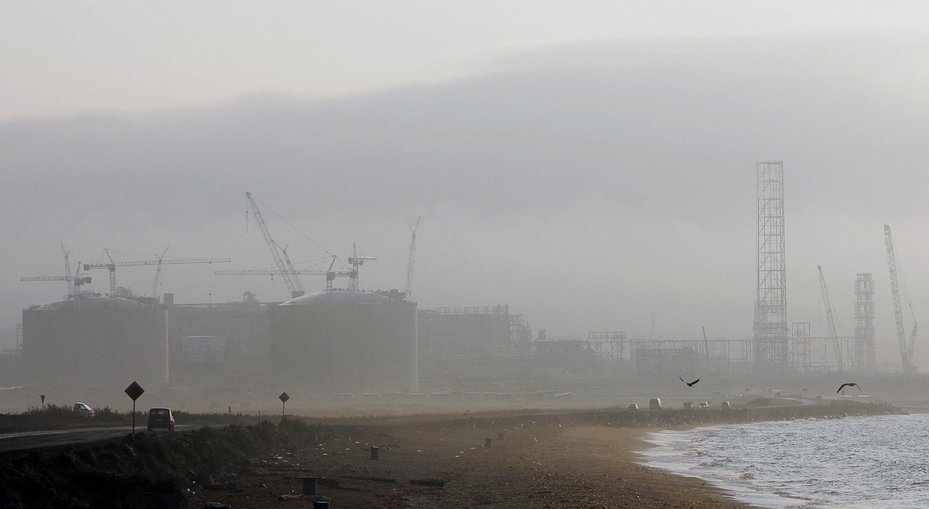
A liquefied natural gas (LNG) plant at Sakhalin 2 whilst under construction in 2006. Denis Sinyakov / AFP via Getty Images
A global ‘budget’ for fossil fuel extraction had first been proposed in 1990, and Shell and Exxon understood the climate impact of their products when they signed these deals in 1994 and 1995. A confidential internal briefing at Shell in 1988 – revealed by a Dutch newspaper in 2018 – predicted rising temperatures and sea levels, flooding, habit destruction and mass migration, and made a clear link to its own products. An internal Exxon memo in 1982, leaked in 2015, warned of a doubling of the atmospheric carbon dioxide concentration and increases in global average temperatures of up to three degrees. The companies chose to sow confusion and doubt about the science, a story well told elsewhere.
Shell and Exxon were both approached for comment prior to publication of this article. Exxon declined to comment, but a spokesperson for Shell said that the company had been ‘talking about climate change and greenhouse gases for decades’ and that it did not have ‘unique knowledge about climate change.’ The spokesperson also said, ‘Shell’s advocacy has become increasingly forward leaning on climate issues over time’ and that it had now had ‘aggressive goals’ on climate.
It took ten or more years of investment, construction and difficulty before extraction at Sakhalin began in the mid-noughties. Russia could not have built the Sakhalin developments alone. The old Soviet oil machine was an onshore beast, and Russia needed help with these wildly ambitious projects involving deepwater drilling, hundreds of kilometres of pipelines linking to an ice-free terminal, and the construction of Russia’s first LNG facility where gas could be cooled and liquefied for shipping to Asia. ‘Gazprom couldn’t do it. The Russian state companies are onshore specialists,’ said a former Shell executive. ’The majors were positioning themselves as the enablers. Exxon was with Rosneft, and the whole idea was that we were going to be Gazprom’s best mate.’
'I wouldn’t like to pass a moral judgement on that’
Meanwhile BP was trying to get a foothold in Russia. It had opened petrol stations in 1996 and bought a stake in an oil company called Sidanco, before combining assets in 2003 with another oligarch-run company to become TNK-BP. The deal was signed in front of Tony Blair, who hosted Putin in London, having attended the opera with him in St Petersburg three years earlier. Putin wasn’t seen as a dictator at that point, BP’s then chief executive John Browne told the Financial Times shortly after the invasion of Ukraine. He was ‘the new broom who would sweep everything out, the big reformer.’
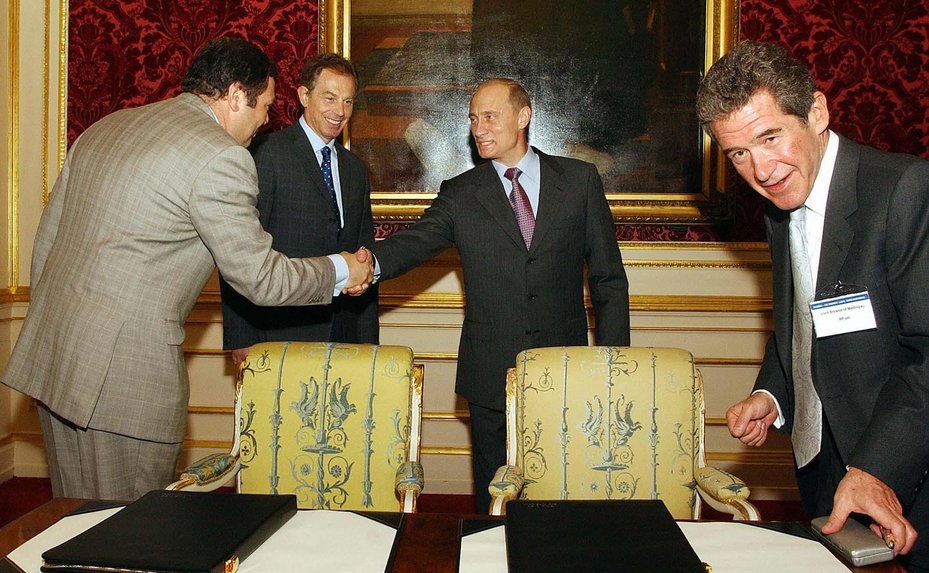
Lord Browne (former CEO of BP), Putin and Blair at Lancaster House, London in 2003 where the TNK-BP deal was signed. John Stillwell / AFP via Getty Images
That’s one way to put it. Evidence of Putin’s disregard for life and the Geneva Conventions was already clearly visible in his war in Chechnya, a separatist state in the Caucasus that had seen off Yeltsin’s forces in the mid-nineties. On the pretext of the bombings in 1999 of four apartment blocks in Moscow and two other cities in which hundreds died – attacks that many observers believe were the responsibility of Russian security forces – Putin cemented his leadership by flattening and laying siege to the Chechen capital Grozny the following winter, killing tens of thousands. By February 2000, Human Rights Watch had documented large-scale massacres and indiscriminate carpet bombing of civilians in Grozny. The reporter John Sweeney described Russia’s total destruction of a village called Katyr Yurt and the bombing of a white-flag convoy of families trying to leave.
The relationship with Putin’s Russia was BP’s new survival strategy
It is inconceivable that BP, signing its deal with TNK in 2003, did not know what Putin was doing in Chechnya. But, as with the other majors, the relationship with Putin’s Russia was BP’s new survival strategy. The previous century’s easy oil in shallow water and huge Middle East fields was over. Since the 1970s state-owned oil companies controlled most of the world’s reserves and the majors were in search of a niche. Their comparative advantage was now in difficult situations: complex construction, combinations of onshore and offshore technology, and liquefied natural gas, all of which were on offer in Russia’s Arctic as Putin tried to resuscitate Russia’s economy from its 1998 crash. Nick Butler, a BP vice-president at the time, has described how BP faced decline unless it went all-in to a new country. The other options were Nigeria (too corrupt, he said) and Iran (where they still weren’t welcome). Russia was the only other option.
BP also knew about climate change. In 1997 it was the first oil major to be open about the risk of fossil fuels, in a speech by then CEO John Browne at Stanford University. Six years later, he was still CEO when BP paid nearly $8 billion for its access to TNK’s giant Russian oilfields. The new company now had access to 3.6 billion barrels of proven reserves, including the Samotlor field, the jewel of the Soviet oil industry and, as BP crowed, ‘the third largest oilfield ever discovered’. It was in decline after peaking in the 1980s, but BP’s new drilling technology increased production by 24% within two years. Samotlor remains high on a recent list of ‘carbon bombs’ – the huge reserves that researchers have identified as essential to keep in the ground, and of which Russia is home to the third highest number.
BP was committed to Russia for the long term. But its TNK partners wanted to cash out. They parted ways in 2013, selling to the Russian state oil company Rosneft. BP came out of the sale with a 19.75% stake in Rosneft and $12.5 billion in cash, $8 billion of which was distributed back to shareholders. The joint venture had paid $190 billion in duties, taxes and excise to the Russian government over that decade.
‘BP made a lot of money,’ said Nick Butler, the former BP vice-president, speaking at a meeting at King’s College in London earlier this year. ‘The oligarchs made a lot of money. And Russia made a lot of money. So some of the value of the resources did... flow back to the country. How it was used? I wouldn’t like to pass a moral judgement on that. But Russia was a little richer as a result of us and other people being there.’
He told Global Witness: ‘When BP invested we believed, as did many western leaders, including Tony Blair, that Russia was changing and that Mr Putin wanted to open up relations with the West. That optimism evaporated over time and it was clear that working there was difficult and that the new Government was becoming more autocratic.’
'I believe BP helped make TNK-BP a serious business and that did create jobs and gave Russia tax and export earnings. BP was able to work to our standards in terms of safety and environmental protection which were a great improvement on what had gone before.’
The human rights situation by 2013
What kind of a state was Putin’s Russia by the time BP doubled down on its investment in the country?
It was a state in which human rights were violated with impunity. In October 2006 the journalist Anna Politkovskaya, a vocal critic of corruption and Putin’s human rights abuses in Chechnya, was murdered in the hallway of her apartment block. The next month Alexander Litvinenko, a former spy and critic of Putin’s regime, died an agonising death in a London hospital after drinking tea poisoned with radioactive polonium. A British inquiry later ruled that Putin ‘probably’ authorised his murder. By 2016 the Committee to Protect Journalists had reported the murders of twenty journalists in the previous decade, and Freedom House had counted 63 violent attacks on reporters. Sergei Magnitsky, a lawyer working for Hermitage Capital Management, an investment fund, was held without charge for nearly a year and died in custody after investigating a huge tax fraud perpetrated by state employees.

The grave of Russian lawyer Sergei Magnitsky pictured in 2012 in Moscow. Andrey Smirnov / Stringer
It was clear that Russia was also a risky place for business owners. In 2003, as BP signed the TNK deal, Putin was already moving against the first generation of oligarchs, particularly those using their power to call for democracy. Platon Lebedev, chair of the Menatep financial group, was in prison. In October his collaborator Mikhail Khodorkovsky, who ran the oil company Yukos, was arrested. Yukos was systematically dismantled and its assets reallocated to the state-owned companies Rosneft and Gazprom. Western companies experienced their own challenges. Shell was backed into a corner in 2006 and forced to hand over 50% of its stake in Sakhalin 2 to Gazprom. BP’s chief in Russia was harassed out of the country in 2008.
But the riches on offer outweighed other considerations, for BP and its peers
But the riches on offer outweighed other considerations, for BP and its peers. ExxonMobil signed a deal with Rosneft to invest more than $500 billion developing reserves in the Arctic and Black Sea. The multiple exploration licences signed between 2012 and 2014 involved a potential 12.3 billion tonnes of oil and gas condensate, and 15.2 trillion cubic metres of gas. Exxon’s initial $600 million drilling investment hit lucky in the Kara Sea, in fields that Rosneft CEO Igor Sechin claimed were equivalent to those of Saudi Arabia. Putin praised ‘efficient international cooperation’ and awarded the Russian Order of Friendship to Exxon’s CEO Rex Tillerson (who would later become Trump’s first Secretary of State). TotalEnergies, the French oil giant, was also working on new deals. During 2013 and 2014 it agreed a fracking project in Western Siberia in partnership with the Russian oil company Lukoil.
In 2013, the year that BP bought into Rosneft, the IPCC reported that evidence for warming of the earth’s surface was now ‘unequivocal'.
2014: Crimea and the first sanctions
In February and March 2014 Putin annexed Crimea, a region of Ukraine, resulting in EU and American sanctions targeting Russian oil. Subsequent financial and trade press analysis of the Russian oil industry would say things like ‘before Russia first signalled its rift with international norms by annexing Crimea in 2014’ – as if the Russian state had not, long before 2014, already clearly signalled its departure from international norms by murdering journalists, poisoning one of its own citizens with radioactive substances on foreign soil, and flattening cities in breakaway states (Chechnya) and those of murderous allies (Syria).
The motivation of the US and EU was ambivalent. Diplomatically, they needed to be seen to be taking a firm line. But Putin’s impunity had been growing for years under the gaze of western governments as well as western oil majors, and these governments weren’t yet prepared to risk shortages, so the restrictions they imposed targeted future rather than current production. The immediate impact on Russia was limited. In 2016 its oil production growth was at its highest for 11 years, and gas exports to Europe hit record highs in 2016 and 2017. Its economy slumped, but that was as much to do with the fall in oil prices following the fracking revolution in the US.
The bans on lending and on deep water and Arctic technology exports did have an impact in delaying projects that were at a critical stage, where Russia was dependent on technical expertise brought by the majors. After ExxonMobil unsuccessfully lobbied the Obama and Trump administrations for a sanctions waiver, in 2018 it announced it would withdraw from its joint ventures with Rosneft.
But the limited nature of the sanctions can be seen in the list of projects that continued or were initiated. Let’s take the French major TotalEnergies. In mid-2015, Total – which also called for the sanctions to be lifted – was celebrating as its Termokarstovoye gas field in northern Siberia came on stream, run as a joint venture with its partner, the Russian gas giant Novatek (in which Total had, by that point, an 18.2% stake). (Novatek had specifically acknowledged as the project commenced that Total’s technology capabilities would be complementary.) Together with Novatek, and with help from European engineering companies, South Korean manufacturers of vessels and Chinese manufacturers of LNG modules, Total was also constructing Yamal LNG, a ‘colossal’ new plant in the Arctic that would ship its first cargo of liquefied natural gas at the end of 2017. In May 2018 Putin and the French president Emmanuel Macron witnessed the signing of Total’s agreement with Novatak to buy 10% of another massive gas project, Arctic LNG 2. Total’s Kharyaga field had already produced 15 million tonnes of oil and generated $3 billion for Russia since 1999.
Like the other majors, Total had known about the consequences of burning fossil fuels for decades. Researchers in Total’s internal archives found warnings of the climate impact of burning fossil fuels from 1971. In a statement on its website published in response to academic research detailing what the company knew in 1971, Total said that in the 1970s its knowledge of global warming was no different to that published in scientific journals at the time.
2014-2022: New enablers
The sanctions on bank lending did have one impact: they brought new sources of finance into the inner circle of Putin’s enablers and strengthened emerging relationships.
One new lender was China, whose banks and investment funds could replace some of the western credit that had been lost; much of Russia’s oil finance had previously come from French and German banks. China in turn gained access to the oil, which in summer could travel across the shorter and now ice-free Arctic route.
Another credit source was the commodity traders, who made themselves indispensable to Putin with their old habit of oil-backed loans: credit repayable directly in oil cargoes. When Rosneft needed to raise $55 billion to buy TNK-BP in 2013, $10 billion came from Vitol and Glencore, the largest ever oil-backed deal. Their rival Trafigura developed its relationship with Rosneft with $1.5 billion of short-term oil-backed loans that were not affected by the sanctions. These got Rosneft out of a sticky situation when the commercial bank loans from the 2013 TNK-BP purchase were coming due in late 2014 and further credit was sanctioned. ‘We have seen a niche,’ said chief executive Jeremy Weir in early 2015.
Glencore was already becoming the main trader of Rosneft’s oil, after a shift in Kremlin policy away from previous favourite Gunvor, when it surprised observers in 2016 by buying a 19.5% stake in Rosneft. Glencore put up a fraction of the cash itself and brought in the Qatari Investment Authority, currently its second largest shareholder, with the details hidden behind offshore companies. The deal provided $11 billion to the Russian government, 220,000 barrels a day to Glencore, and a Russian Order of Friendship for its boss Ivan Glasenberg.
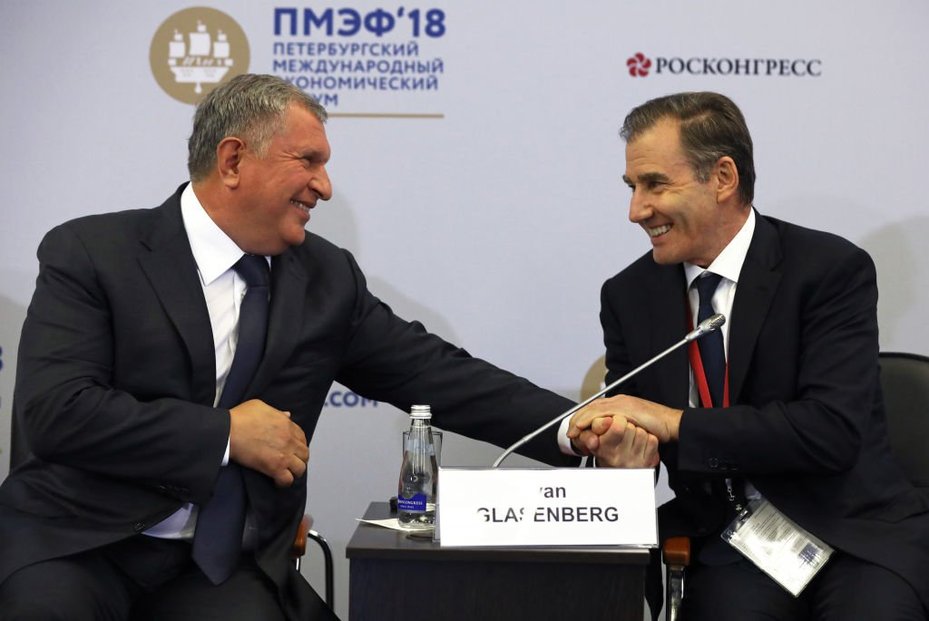
Igor Sechin, CEO of Rosneft, and Ivan Glasenberg, former CEO of Glencore, at the St. Petersburg International Economic Forum (SPIEF) in 2018. Chris Ratcliffe / Bloomberg via Getty Images
During 2020 and 2021 Trafigura and Vitol bought into Vostok Oil, Rosneft’s vast new Arctic project. Its 52 licences cover a potential 5.4 billion tons of oil which could produce over 14 billion tonnes of CO2 emissions. Trafigura’s 10% and Vitol and Mercantile & Maritime’s 5% of the project contributed $7 billion and $4 billion respectively. They weren’t providing the kind of technical assistance that the majors might. But they brought cash in an environment when western banks were prohibited from lending, and added credibility that helped Rosneft’s prospects with other lenders.
Most of these investments did not contravene the 2014 sanctions. (Exxon was found to have violated US sanctions by doing business with Rosneft’s CEO who was blacklisted, and fined $2 million, which is small change for a company that size). But they are an indication that the oil majors and traders were happy to do business with Putin’s regime regardless of the events which caused it to be sanctioned. There can be no doubt that, from 2014 onwards, they knew what they were dealing with.
2022: Supporting conflict
In February 2022 Russia invaded Ukraine, followed by a wave of statements from oil companies – some of them preceding new sanctions – that they would leave Russia. BP, Shell and Equinor all quickly said they’d get out. Exxon declared force majeure – the ‘act of God’ clause in any contract – on Sakhalin 1 at the end of April: shipping firms, wary of sanctions, were refusing to carry its cargoes. Production at Sakhalin 1 fell by 95% after Exxon withdrew its non-Russian staff in July, indicating the extent of reliance on Exxon up until that point. In practice, selling their stakes has been harder. Putin has prohibited companies from ‘unfriendly countries’ – this affects companies including BP and ExxonMobil – from divesting assets before the end of this year; he nationalised Sakhalin 2, in which Shell still had a 27.5% stake, in July. BP has written off $25.5 billion; Shell said in April it would write down $4-5 billion. In December, nine months after the invasion, Total said it would write-off $3.7 billion of its investment in Novatek and withdraw its directors from their baord.
A recent Global Witness investigation uncovered possible links between Total’s own joint venture and the Russian military jet fuel supply chain. Gas condensate supplied by Terneftegaz – a company that was jointly owned by Total and Novatek – was processed by a plant called Purovsky owned by Novatek (Total also has a 19.4% stake in Novatek, although it announced in December that it is writing this off). According to rail freight data from Refintiv analysed by Global Witness, some of the gas condensate from this plant is likely to have been sold on to Gazprom’s Omsk refinery where it was subsequently turned into jet fuel sent to locations near Russian air bases. Global Witness identified hundreds of shipments of jet fuel from the Omsk refinery to stations near Russian Air Force bases near Ukraine in the lead-up to the invasion on 24 February and since then. In Global Witness’ view, even if Total had pulled out of Russia already, it would still bear moral responsibility, because it helped to build the Terneftegaz Termokarstovoye field long after Putin had shown his colours.
In Total’s response to our original investigation, it strongly denied that any of its gas condensate was used as feedstock for military jet fuel for the Russian air force. Instead, Total quoted a statement from Novatek which said that all the condensate produced by Terneftegaz was processed and sent to Ust-Luga which ‘manufactures a series of products including kerosene which is exclusively exported outside Russia and this jet fuel does not have the necessary certificates to be sold on the Russian market.’ Total’s full response to the Global Witness investigation can be read here.
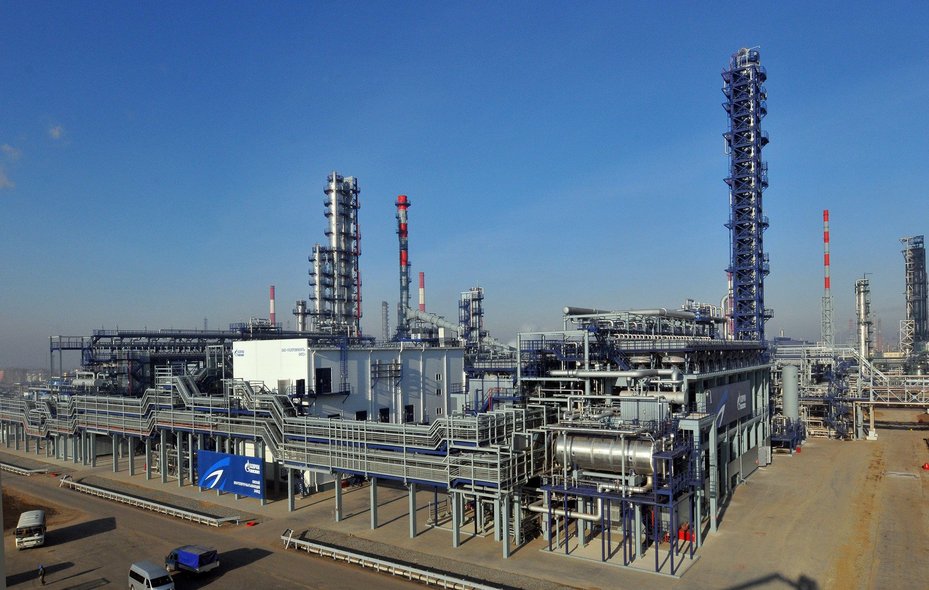
Gazprom Neft's Omsk refinery which makes jet fuel that is shipped to locations near Russian military air bases. Neftehim
Prior to publication of this article, Global Witness approached BP, Shell and Exxon for comment on their relationship to Russia, the conflict in Ukraine and Putin’s human rights record.
A spokesperson for BP said, ‘We reject any suggestion that simply doing business in Russia, alongside hundreds of other foreign investors and companies prior to the invasion of Ukraine, somehow equates to complicity in Russia’s war in Ukraine. In February 2022, within the first 96 hours of the invasion, and as one of the first companies to do so, we announced that we were exiting Rosneft and our businesses with Rosneft in Russia. We have also ceased all other business activities and operations in Russia. We no longer have any directors on the board of Rosneft and in our first quarter 2022 results we wrote down the value of our Rosneft shareholding and businesses to zero and took a pre-tax charge of $25.5 billion related to Russia.’
A spokesperson for Shell said, ‘Shell is committed to respecting human rights as set out in the UN Universal Declaration of Human Rights and the International Labour Organization Declaration on Fundamental Principles and Rights at Work. Our approach is informed by the UN Guiding Principles on Business and Human Rights.
Exxon declined to comment.
What about the commodity traders? In July Trafigura sold its Vostok stake to a Hong Kong trading company incorporated nine days before the invasion of Ukraine. According to data from Refinitiv Eikon the company was also delivering cargoes of fuel oil from Russian ports to Romania and Croatia in October. Vitol announced in April it would do no new business with Russia and would start to reduce its trading activity, although Amur Trading – in which Vitol is an indirect shareholder – was still trading Russian oil in May. Vitol is reportedly trying to sell its Vostok stake. Glencore has not yet sold its small stake in Rosneft, saying there is ‘no realistic way' of doing so in the current environment.
A Global Witness investigation found that in the calendar month following Russia’s invasion of Ukraine, the three companies transported more oil from Russian ports than they had done in the same period over the previous three years. Trafigura and Glencore said they were continuing to fulfil their legal obligations under long term contracts and were not doing new business; Vitol contested our figures. Global Witness is not accusing any of these companies of breaking sanctions.
Vitol, Glencore and Trafigura were all approached for comment prior to publication of this article.
A spokesperson for Trafigura said, ‘We unconditionally condemn the war in Ukraine and the humanitarian crisis this is causing. Trafigura complies with applicable sanctions. Trafigura ceased purchasing crude and substantially reduced purchases of oil products from Russian counterparties targeted by sanctions before the 15 May deadline as publicly stated at the time. Trafigura does not and has never operated any oil or gas assets in Russia. As soon as the war broke out in Ukraine we immediately froze our sole investment in Russia. Trafigura’s passive, non-operational 10% stake in the Vostok Oil project was acquired in late December 2020. Trafigura has not received any dividends or similar payments from its shareholding in Vostok Oil which is primarily a project in development.’
Vitol and Glencore declined to comment.
Russia earned €158 billion from oil and gas in the first six months of Putin’s invasion of Ukraine, contributing approximately €43 billion to the federal budget. The sanctions so far – including an outright ban on Russian crude to the EU introduced in December – have significantly reduced oil exports to Europe. However, the majors and traders are still legally finding ways round them. One loophole exposed by Global Witness includes a caveat allowing Russian and Kazakh oil to be mixed and exported. Another is that once refined, for example in India, oil products can be exported to countries like the US that have sanctioned direct imports of Russian oil. British firms have helped transfers of Russian oil between tankers off the Suffolk coast before it is shipped to refineries around the world.
The need for sanctions, renewables and demand-reduction
These loopholes need closing and the sanctions need strengthening. But the bigger picture is demand, which will always make sanctions leaky.
The oil majors tend to lean on ‘demand’ in their responses to criticism. They say that it is for governments to set policy, which they will follow. In one sense this is true. Western governments have proceeded in lockstep with the majors: helping to open doors, blessing their deals and shaping energy policies around assumptions of continuing supply despite repeated warnings since the early 2000s that reliance on Russian gas was risky.
But it is also disingenuous. The majors shape policy more than they follow it. By helping Russia to create new oil and gas projects they created revenue streams for Putin and ensured that he can fuel his war machine, even if the newer Arctic projects are now delayed.
And their contribution to Europe and America’s climate policy has, for years, been to obstruct radical action towards renewables that would reduce demand for oil and gas. There were more than 636 fossil fuel industry lobbyists at the COP27 climate talks in 2022, more than any national delegation bar the United Arab Emirates. No major has yet made sufficient commitments to an explicit end-date for extraction or for sufficiently phasing down production in light of a 1.5 degree target, regardless of their renewables commitments.
It is time for governments to break the death-hold of this industry on the people of Ukraine and the future of humanity
These companies have shown they will not voluntarily shut down their hydrocarbon interests in the necessary time frame. And it is disturbing to see the UK and US’s current substitution strategies, such as North Sea oil licences or increased imports from Kuwait and Saudi Arabia, in the absence of more radical alternatives.
It is time for governments to break the death-hold of this industry on the people of Ukraine and the future of humanity. It is time for visionary investment in renewable energy together with equitable demand-reduction in already-developed countries, and for all citizens to demand this.
